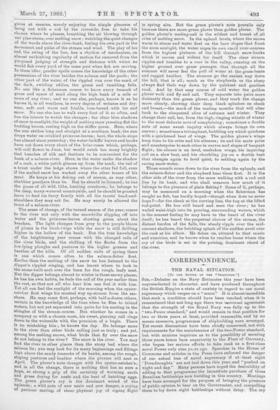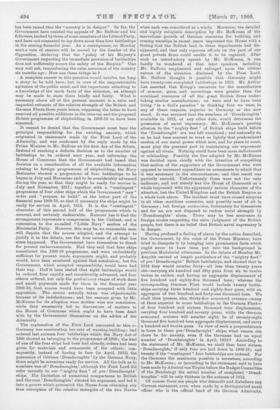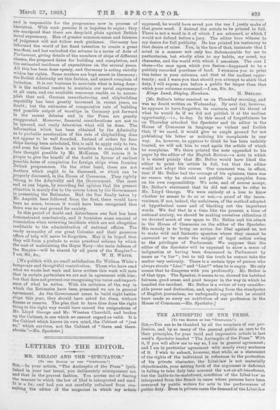CORRESPONDENCE.
THE NAVAL SITUATION.
[TO Till EDITOR OF Till " SPIZOTATOlt...] SIR,—Debates on the Navy Estimates this year have been unprecedented in character, and have produced throughout the British Empire a state of anxiety in regard to our naval supremacy which verges on a "scare." It is almost incredible that such a condition should have been reached, when it is remembered that not long ago there was universal agreement that the strength of the Royal Navy was fully up to the " two-Power standard," and would remain in that position for two or three years at least, provided reasonable, and by no means excessive, programmes of shipbuilding were arranged. Yet recent discussions have been chiefly concerned, not With requirements for the maintenance of the two-Power standard, but with anxious inquiries as to the possibility of securing three years hence bare superiority to the Fleet Of Germany, who began her serious effoits to take rank as a first-class naval Power only nine yez.ra ago. Speeches in the House of Commons and articles in the Press have enforced the danger of our actual loss of naval supremacy if at ,least eight Dreadnoughts ' are not laid down this year, and "pushed on night and day." Many persons have urged the desirability of adding to that programme the immediate purchase of three Brazilian battleships now building in this country. Meetings have been arranged for the purpose of bringing the pressure of public opinion to bear on the Government, and compelling them to lay down eight battleships without. delay. The cry
has been raised that the " country is in danger." So far, the Government have resisted the appeals of Mr. Balfour and his followers, backed by those of some members of the Liberal Party,
and have not consented to lay down more than four battleships in the coming financial year. As a consequence, on Monday
next a vote of censure will be moved by the Leader of the Opposition, declaring that the "policy of his Majesty's Government respecting the immediate provision of battleships does not sufficiently secure the safety of the Empire." One may well ask, remembering the calm assurance of the country six months ago: How can these things be ?
A complete answer to this question would involve too long a story to be told here ; but in view of the unquestionable agitation of the public mind, and the importance attaching to a knowledge of the main facts of the eituation, an attempt may be made to state them briefly and fairly. What is necessary above all at the present moment is a calm and impartial estimate of the relative strength of the British and German Fleets three years hence, supposing the latter to have received all possible additions in the interval, and the proposed British programme of shipbuilding in 1909-10 to have been executed.
It cannot be denied that the Government must bear the principal responsibilite for the existing anxiety, which originated in statements made by the First Lord of the Admiralty, and was confirmed by the reply made by the Prime Minister to Mr. Balfour on the first day of the debate. Instead of reaching a definite decision as to the number of battleships to be ordered next year, and informing the House of Commons that the Government had based that decision on a consideration of all the available information relating to foreign programmes of shipbuilding, the Navy Estimates showed a programme of four battleships to be begun in July and November and to be considerably advanced during the year, so that they might be ready for service in July and November, 1911; together with a "oontingent" programme of four other ships which the Government " may " order and "prepare to build" at the latter part of the financial year 1909-10, so that if necessary the ships might be ready for service in April, 1912. It is the "contingent" character of this second half of the programme which is unusual, and certainly undesirable. Rumour has it that the arrangement represents a compromise in the Cabinet, and a concession to the so-called "Little Navy" section of the Ministerial Party. However this may be, no reasonable man will dispute that the course adopted, and the attempt to justify it in the debate, are the true causes of all that has since happened. The Government have themselves to thank for present embarrassments. Had they said that four ships constituted the 1909-10 programme, and were undoubtedly sufficient for present needs, arguments might, and probably would, have been mustered against that conclusion; but the Government, which accepted responsibility, would have had their way. Had it been stated that eight battleships would be ordered, four rapidly and considerable advanced, and four others ordered, but only the preliminary stages of work done and small payments made for them in the financial year 1909-10, that course would have been accepted with little opposition. The course actually taken was objectionable because of its indefiniteness ; and the reasons given by Mr. McKenna for its adoption were aeither wise nor conclusive, while they necessarily led to discussions of matters in the House of Commons which ought to have been dealt with by the Government themselves on the advice of the Admiralty.
The explanation of the First Lord amounted to this— Germany was accelerating her rate of warship-building ; bad ordered last autumn four battleships which the Navy Act of 1908 showed as belonging to the programme of 1909; the keel of one of the four ships had been laid already, orders bad been given for materials and armaments of the others ; con- sequently, instead of having to face (in April, 1912) the poesession of thirteen 'Dreadnoughts' by the German Navy, there might be seventeen ready for service. All the talk as to numbers was of 'Dreadnoughts,' although the First Lord did refer casually to our "mighty fleet" of pre-' Dreadnought' ships. His limitation of numerical comparisons to British and German 'Dreadnoughts' vitiated his argument, and led it into a groove which prevented the House from obtaining any true conception of the relative strengths of the two Navies
when each was considered as a whole. Moreover, the detailed and highly eulogistic description by Mr. McKenna of the marvellous growth of German resources for building and arming warships in recant years impressed the House with a feeling that the British lead in those departments had dis- appeared, and that only vigorous efforts on the part of our great private firms could enable it to be regained. After such an introductory speech by Mr. McKenna, it can hardly be wondered at that later speakers, including Mr. Balfour, emphasised and enlarged upon the critical nature of the situation disclosed by the First Lord.
Mr. Balfour thought it possible that Germany might have twenty-one completed battleships in 1912. Mr. Arthur Lee asserted that Krupp's resources for the manufacture of armour, guns, and mountings were greater than the combined resources of all the great British firms under- taking similar manufactures ; we were said to have been
living "in a fool's paradise" in thinking that we were, in any of these respects, superior to Germany as she now stood. It was assumed that the numbers of 'Dreadnoughts available in 1912, or any other date, would determine the possession of naval supremacy. Mr. McKenna's passing allusion to the "mighty fleet" of British ships built before the 'Dreadnought' era was left unnoticed ; and naturally so, as he had been content to treat so lightly that predominant section of our naval power which now, and for years to come, must play the greatest part in maintaining our supremacy against all rivals. Nothing could have been more unfortunate or misleading. Possibly the line adopted by Mr. McKenna was decided upon chiefly with the intention of compelling that section of the supporters of the Government who were opposed to increased expenditure on armaments to admit that it was necessary in the circumstances; and that result was partially secured. Unfortunately these were not the only audience ; and not merely was the House of Commons as a whole impreised with the apparently serious character of the situation, but the United Kingdom and the British Empire as a whole took alarm. The incident must have caused surprise in all other maritime countries, and possibly most of all in Germany ; but foreign authorities, fortunately for themselves and for us, are not disposed to reckon naval strength by 'Dreadnoughts' alone. There may be less assurance in foreign circles respecting the calm judgment of the British people, but there is no belief that British naval supremacy is in danger.
Having produced a feeling of alarm by the action described, the Government, by the voice of the Prime Minister, have tried to dissipate it by bringing into prominence facts which ought never to have been put into the background in previous Ministerial utterances. In the debate of Monday Mr. Asquith recited at length particulars of the "mighty fleet' of pre-' Dreadnought' British battleships, and showed that in 1912 they would number forty—all less than twenty years old—carrying :six hundred and fifty guns from six to twelve inches in calibre, and having an aggregate displacement of five hundred and eighty-five thousand tons; whereas the corresponding German Fleet would include twenty battle- ships carrying three hundred and eighty-four guns, with an aggregate of two hundred and forty-one thousand tons. We shall then possess, also, thirty-five armoured cruisers—many of them superior to some battleships in the German Fleet— of four hundred and sixteen thousand tons displacement, carrying four hundred and seventy guns; while the German armoured cruisers will number eight, be of seventy-eight thousand five hundred tons aggregate displacement, and carry a hundred and twelve guns. In view of such a preponderance in force in these pre-' Dreadnought' ships, what reason can there be for anxiety, even if the Germans had an equal number of 'Dreadnoughts' in April, 1912? According to the statement of Mr. McKenna, we shall then have sixteen 'Dreadnoughts,' if only four are laid down in 1909-10; and twenty if the "contingent" four battleships are ordered. For the Germans the maximum possible is seventeen, according to Mr. McKenna ; or (according to the statement said to have been made by Admiral von Tirpitz before the Budget Committee of the Reichstag) the actual number of completed ' Dread- noughts' will be only thirteen in the autumn of 1912.
Of course there are people who discredit and disbelieve any German statement, even when made by a distinguished naval officer who is the official head of the German Admiralty,
Wand is responsible for the programme now in process of execution. With such persons it is hopeless to argue : they are convinced that there are deep-laid plots against British naval supremacy. Men of greater common-sense and fairness of judgment will not follow such guidance. Germany has informed the world of her fixed intention to create a great War-fleet, and has embodied the scheme in a series of Acts of Parliament, giving details of the numbers of ships of different classes, the proposed dates for building and completion, and the estimated incidence of expenditure on the several Years. All this has been done openly, and Germany is rusting strictly Within her rights. Some matters are kept secret in Germany; the British Admiralty set this fashion, and cannot complain of imitation. It is our business to ascertain what is being done : it is the national resolve to maintain our naval supremacy at all costs, and our available resources enable us to accom- plish that end. German manufacturing and shipbuilding capability has been greatly increased in recent years, no doubt; but the estimates of comparative rate of building and possible output of warships in Germany put forward in the recent debates and in the Press are greatly exaggerated. Moreover, financial considerations are not to be ignored, and really determine what will be done. The information which has been obtained by the Admiralty as to probable acceleration of the rate of shipbuilding does not appear to be well founded. Instead of orders for four ships having been antedated, this is said to apply only to two, and even for these there is no intention to complete. at the date thought possible by Mr. McKenna. Of course it is Proper to give the benefit of the doubt in favour of earliest possible dates of completion for foreign ships when framing British programmes. On the other hand, these are not matters which ought to be discussed, or which can be properly discussed, in the House of Commons. They rightly belong to the Admiralty and the Government. One must end as one began, by recording the opinion that the present eituation is mainly due to the course taken by the Government in presenting the Estimates. Had the line finally taken by Mr. .A.squith been followed from the first, there would have been no scare, because it would have been recognised that there was no real ground for anxiety.
In this period of doubt and disturbance one fact has been demonstrated conclusively, and it furnishes some amount of consolation when reviewing incidents which are not altogether creditable to the administration of national affairs. The ready sympathy of our great Colonies and their generous offers of help will never be forgotten. May it be hoped that they will form a prelude to soine practical scheme by which the cost of maintaining the Royal Navy—the main defence of the Empire—will be shared by all parts of the Empirel)-- I am, Sir, So., W. IL WHITE.
[We pu,blish with no small satisfaction Sir William White's • temperate and thoughtful contribution. Those who have read what we wrote last week and have written this week will note
that in certain particulars we are not in agreement with him ; but that does not prevent our recognising the value and import- ance of what be writes. With his criticism of. tile way in which the Estimates have been presented we are in general agreement. As the Government mean to build eight battle- ships this year, they should have asked for . them without finesse or reserve. The plea that to have thus done the right thing in the right way would have caused the resignations of Mr. Lloyd George and Mr. Winston Churchill, and broken up the Cabinet, is one which we cannot regard as valid. It is the Cabinet which knows its own mind, the Cabinet of "just Be," which survives, not the Cabinet of "there and there- abouts."—ED. Spectator.]












































 Previous page
Previous page